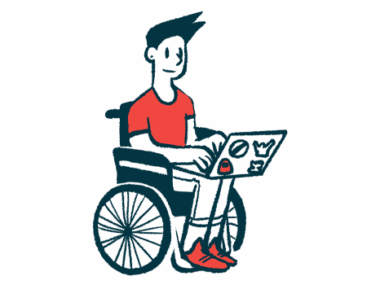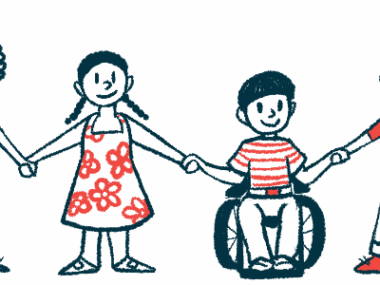Being Rare Is All I’ve Ever Known
Written by |

If you were to sort through my medical records, you would notice that some of the files list my diagnosis as “SMA I/II.” I had a good chuckle the first time I noticed this. After all, there is no such thing as spinal muscular atrophy type 1/2.
I was originally diagnosed with SMA based on milestones I didn’t reach. Because I hadn’t been able to crawl, roll over, or hold my head up unassisted, my doctor used his best judgment and diagnosed me with Werdnig-Hoffmann disease, or SMA type 1, at around 6 months of age.
While this went on the books as my official diagnosis, doctors soon realized I don’t fit the textbook definition of Werdnig-Hoffmann disease. This is how SMA I/II earned its spot on some of my documentation. Even though I didn’t reach certain milestones by a certain age, as I got older, I fared better, and grew stronger, than doctors expected. My symptoms presented more like SMA type 2 than type 1.
Of course, differentiating between the two types can be difficult, especially since SMA presents differently in everyone. But because I didn’t require any breathing assistance besides BiPAP, had only minor issues with swallowing and speaking, and maintained some strength, I teetered between a strong type 1 and a weak type 2.
After all these years, I still haven’t made sense of my unusual SMA diagnosis, or how I feel about it.
On one hand, I am grateful. Given my prognosis and trajectory, I have to count my blessings. I was only given two years to live, and have now exceeded that by 29 years. My life is a profound gift I don’t take for granted.
On the other hand, living with a rare disease has its drawbacks.
For many years, I missed out on clinical trials because I didn’t meet all the criteria for type 1 patients. I’ll never forget feeling excited, thinking I’d finally be able to participate in a trial, only to be met with disappointment and sadness.
Then there are my many mysterious symptoms and ailments, which have made it tough to find effective treatment plans. As a result, my mind and body are often at war as I try to understand my symptoms. Despite test after test, they remain unexplained. And the longer my issues go undiagnosed, the harder I must fight the urge to resent my rarity. Perplexing doctors is a talent I’m not proud of.
Nevertheless, being rare is an integral part of who I am. While the nuances of my rarity are sometimes difficult to grasp and process, I’d be remiss to ignore how they have molded me into who I am today and influenced my everyday life.
When I consider what it means to be rare, I think about all the valuable lessons it has taught me about resiliency. I recognize that my path has helped me discover an inner strength I would have never known otherwise, and I see how it has shaped me into the person I have become.
Being rare is all I’ve ever known. Whether I’m facing a challenge, filled with gratitude, or desperately trying to make sense of my health issues, this is my rare, beautiful life to live. And I’m determined to live it well.
***
Note: SMA News Today is strictly a news and information website about the disease. It does not provide medical advice, diagnosis, or treatment. This content is not intended to be a substitute for professional medical advice, diagnosis, or treatment. Always seek the advice of your physician or other qualified health provider with any questions you may have regarding a medical condition. Never disregard professional medical advice or delay in seeking it because of something you have read on this website. The opinions expressed in this column are not those of SMA News Today, or its parent company, Bionews, and are intended to spark discussion about issues pertaining to spinal muscular atrophy.








Leave a comment
Fill in the required fields to post. Your email address will not be published.